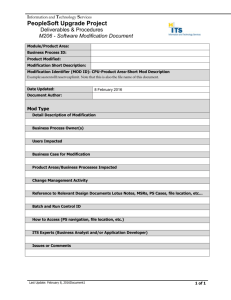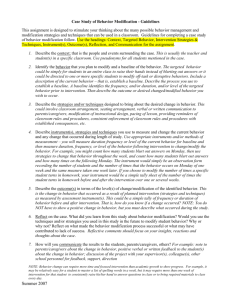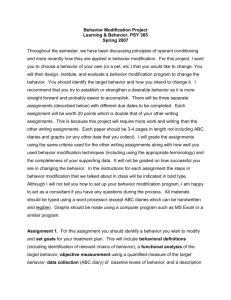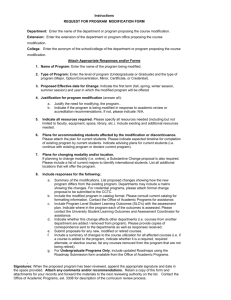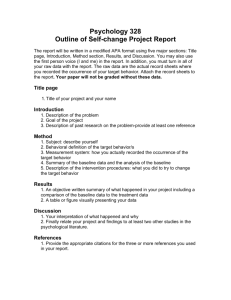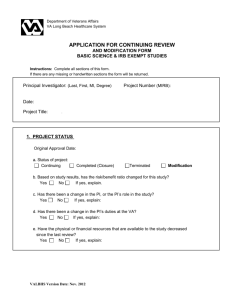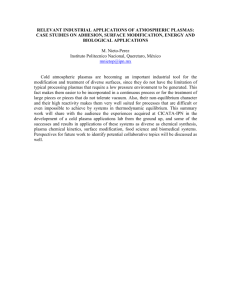EPS 606 Applied Behavior Management
advertisement
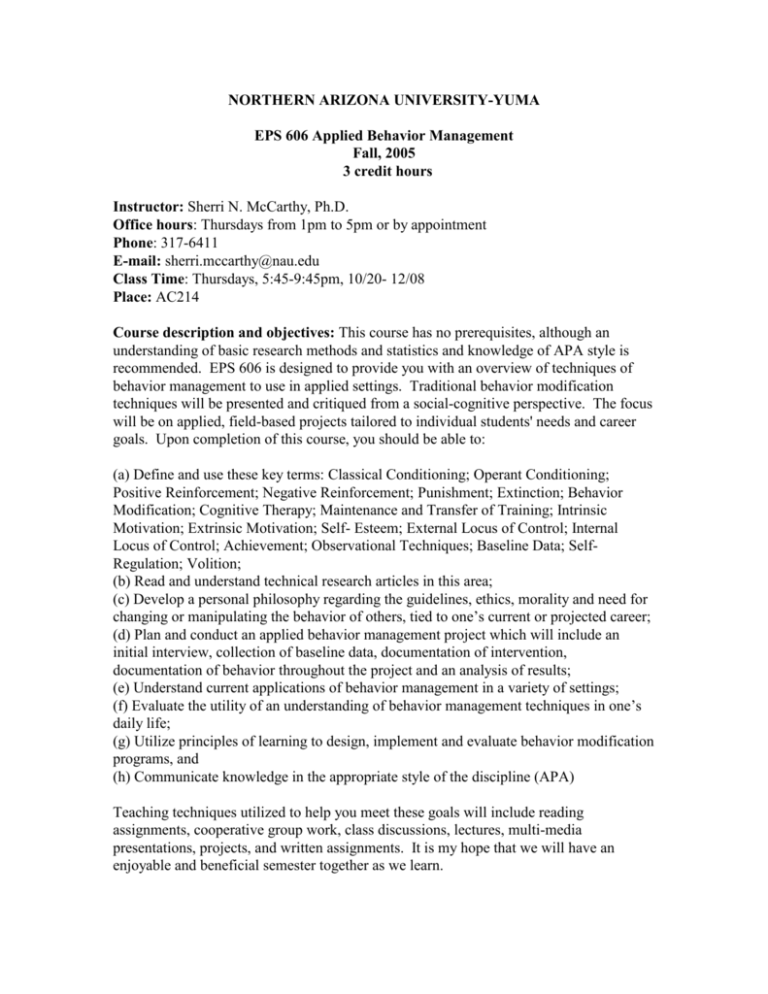
NORTHERN ARIZONA UNIVERSITY-YUMA EPS 606 Applied Behavior Management Fall, 2005 3 credit hours Instructor: Sherri N. McCarthy, Ph.D. Office hours: Thursdays from 1pm to 5pm or by appointment Phone: 317-6411 E-mail: sherri.mccarthy@nau.edu Class Time: Thursdays, 5:45-9:45pm, 10/20- 12/08 Place: AC214 Course description and objectives: This course has no prerequisites, although an understanding of basic research methods and statistics and knowledge of APA style is recommended. EPS 606 is designed to provide you with an overview of techniques of behavior management to use in applied settings. Traditional behavior modification techniques will be presented and critiqued from a social-cognitive perspective. The focus will be on applied, field-based projects tailored to individual students' needs and career goals. Upon completion of this course, you should be able to: (a) Define and use these key terms: Classical Conditioning; Operant Conditioning; Positive Reinforcement; Negative Reinforcement; Punishment; Extinction; Behavior Modification; Cognitive Therapy; Maintenance and Transfer of Training; Intrinsic Motivation; Extrinsic Motivation; Self- Esteem; External Locus of Control; Internal Locus of Control; Achievement; Observational Techniques; Baseline Data; SelfRegulation; Volition; (b) Read and understand technical research articles in this area; (c) Develop a personal philosophy regarding the guidelines, ethics, morality and need for changing or manipulating the behavior of others, tied to one’s current or projected career; (d) Plan and conduct an applied behavior management project which will include an initial interview, collection of baseline data, documentation of intervention, documentation of behavior throughout the project and an analysis of results; (e) Understand current applications of behavior management in a variety of settings; (f) Evaluate the utility of an understanding of behavior management techniques in one’s daily life; (g) Utilize principles of learning to design, implement and evaluate behavior modification programs, and (h) Communicate knowledge in the appropriate style of the discipline (APA) Teaching techniques utilized to help you meet these goals will include reading assignments, cooperative group work, class discussions, lectures, multi-media presentations, projects, and written assignments. It is my hope that we will have an enjoyable and beneficial semester together as we learn. Course policies: I expect each of you to complete assignments on time and attend every class (barring major emergencies, which you must inform me of). Please bring your textbooks to each class, as well. I utilize cooperative grouping, class meetings, lecture and discovery learning as tools to help you master the content of this course during the time we have together. We will also use class forums as a technique to refine and improve each other's projects. Your input is welcome and encouraged. Please feel free to discuss questions or concerns you may have with me throughout our class. It is my hope that we will have a rewarding, enjoyable course together which will provide you with useful information to apply in your careers for years to come. Recommended Textbook: American Psychological Association (2004). Publication Manual of the American Psychological Association.5th Edition Washington, DC: APA. Required Textbook: Kazdin, A. E. (1994). Behavior Modification in Applied Settings. (5th Edition). Pacific Grove, CA: Brooks/Cole Publishing. Grading: I utilize a point scale for grading. 90%+ (450 points or more) =A; 80%-89%(400-449 points) =B; 70%-79%(350-399 points) =C etc. Possible points are accrued as follows: Class participation and activities: 140 points Class points cannot be made up. Students are expected to be present for all classes and participate in discussions and activities in a constructive and collegial manner. In order to earn full points (20 per class session), you must be prepared for and involved in all of the evening’s activities. Personal Philosophy of Behavior Management 100 points No later than October 27, you will need to turn in a formal, APA-style paper in which you reflect upon and analyze the morality of controlling another’s behavior. You may use your in-class position paper as a draft, if you wish. Explain the ethical principles by which you plan to abide in the setting(s) where you will apply techniques of behavior management. Give this assignment serious thought and reflection. Indicate when intervention is and is not appropriate in the setting you plan to conduct your project. Also broaden this to other settings. When is it appropriate to control the behavior of others? Use examples, personal experience, references and/or any other information necessary to clearly present your personal philosophy of managing the behavior of others. Also address the role you feel those who understand behavior modification principles should play in social policy decisions regarding the media and other areas, which potentially impact the behavior of others. Article Summaries and Presentations Written Summaries 35 points each Oral Presentations 15 points each 100 points total You will need to find, read, and prepare an APA-style written summary of two recent articles from the field of behavior management. The articles should come from an approved psychology journal, and should relate to your major project. The summaries are due on Nov. 17, and will also be presented in class. Behavior Modification Project 160 points Early in the class, you will need to identify a situation in which you perceive the need to alter the behavior of one or more persons. This may be in your work setting, home setting or social setting. For example, you may choose to develop an intervention for one or more of your employees who demonstrates poor work performance, for your students who are failing or misbehaving or for your spouse who wishes to quit smoking. Once you have identified the target population for your intervention, obtain my approval and begin collecting baseline data. Then, write up a specific intervention plan, two to four weeks in duration, utilizing techniques and principals we have discussed in class. Include a brief literature review in which you refer to journal articles and text pages that provide information you have considered when designing your intervention. Bring your plan before our class forum for suggestions and approval no later than October 30. Next, conduct your intervention. Carefully document each step. Collect data on the target behavior throughout the duration of your project. Then analyze the results. Indicate why you believe your results occurred. If you were successful in changing the behavior, what factors were responsible? If you were unsuccessful, what would you change in the next phase? Do a thorough and well-documented write-up of your intervention project, including all of your data, your initial plan, references, your analysis of results and critique. A sample of an appropriate paper will be provided. Points will be assigned as follows for sections of the project, which will be thoroughly explained during class: Initial Plan (draft) due 11/03 25 points Baseline Data (draft) due 11/10 25 points Documentation (draft) due 12/01 25 points Final Project, including analysis & critique due 12/08 85 points Class Schedule (Note: This schedule may be modified slightly according to class needs. In-class quizzes/assignments will be over previous week's assigned reading.) Topic Course Overview Readings & Assigned Activities Write your personal 10/20 Ethics of behavior control The role of motivation in change Choose your modification topic Form support groups philosophy paper, due 10/27 Get Dana account Review APA style Preview text 10/27 Library orientation Defining and assessing target behaviors Collecting baseline data Principals of conditioning Cognitive techniques Prepare Initial plan, due 11/3 Collect baseline data Read assigned text pages Locate articles 11/03 Discuss and refine plans in editing groups Behavior Management in Clinical settings Behavior Management in School settings Relaxation techniques Guest speaker on hypnotherapy Develop methodology Read assigned text pages Select interventions Prepare baseline data 11/10 Behavior Management in Criminal Justice Class Forum on project progress Behavior modification in Russia: Guest speaker Prepare article summaries and presentations, due 11/17 Read assigned text pages 11/17 Behavior Management in the Workplace Behavior Modification in Society Article summary presentations Work on documentation and project write-up 11/24 HAPPY THANKSGIVING NO CLASS Finish projects 12/01 Methodology, documentation and Complete final papers plan modification Short-term therapy and behavior modification Theoretical basis of behavior modification 12/08 Celebrate success!! Present final projects
